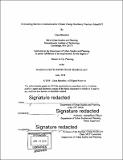Overcoming Barriers to Institutionalize Climate Change Resiliency Practices : MassDOT
Author(s)
Banuelos, Liana (Liana M.)
DownloadFull printable version (16.77Mb)
Other Contributors
Massachusetts Institute of Technology. Department of Urban Studies and Planning.
Advisor
Janelle Knox-Hayes.
Terms of use
Metadata
Show full item recordAbstract
The most pronounced climate change effects in northeastern United States will be increased precipitation events, more frequent heat waves, and substantial sea level rise. These temperature and flooding outcomes place substantial risk on vital infrastructure that supports economic development, public health, and access to resources and amenities within the state of Massachusetts. As such, there is a need to mitigate these risks through long-range planning and climate change adaptation strategies. The Massachusetts Department of Transportation (MassDOT) recognizes that infrastructure must be fortified through these methods but has yet to establish a systematic approach for quantifying climate change impacts, evaluating the costs and benefits of selective intervention, and implementing adaptation strategies. However, MassDOT operates within a complex political setting of constraints and conditions that may or may not be conducive to particular implementation mechanisms. Additionally, the hydrologic modeling and spatial analysis needed to identify specific areas of transportation infrastructure that are especially vulnerable to climate change effects will not be completed until late 2018. Cognizant of these constraints, this thesis aims to (1) synthesize the best climate change resiliency strategies from other large infrastructure owners/DOTs and (2) draw upon lessons learned from other agencies to recommend strategies for overcoming barriers to institutionalization at MassDOT. In this way, the department will have a roadmap to addressing existing gaps and barriers to implementation once the climate adaptation and vulnerability assessment tool has been developed. By strategically protecting infrastructure that will have the greatest benefit to MassDOT's constituents at the least cost, the department will be able to minimize the impacts of climate change and maintain a satisfying level of service despite increasing climate stresses on infrastructure and operations.
Description
Thesis: M.C.P., Massachusetts Institute of Technology, Department of Urban Studies and Planning, 2018. Cataloged from PDF version of thesis. Includes bibliographical references (pages 91-93).
Date issued
2018Department
Massachusetts Institute of Technology. Department of Urban Studies and PlanningPublisher
Massachusetts Institute of Technology
Keywords
Urban Studies and Planning.